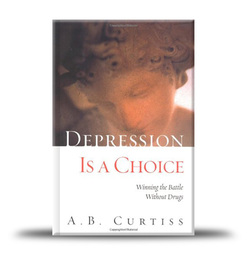Winning the Battle Without Drugs

In this revolutionary and provocative work, a psychotherapist with a family history of depression takes a hard look at the syndrome and how to overcome it naturally -- without medication.
What if Prozac was not the best answer to depression? What if you could learn to think your depression away? What if you could "pull the plug" on depression any time you wanted? What if depression is a choice?
Of the more than 19 million Americans who suffer from depression, many will turn to psychotropic drugs for relief. Psychotherapist A. B. Curtiss raises powerful questions about this trend -- pointing out that for most of us depression is not a disease to be cured by antidepressant drugs, which only offer temporary relief, but the accidental escalation of a necessary defense mechanism—the flight or fight response. She advocates a process called "directed thinking" to permanently manage depression and brainswitch excercises to practice new thinking techniques. Curtiss maintains that using these exercises to bring about new ways of thinking will form new get-out-depression neural patterns that can be used in place of the old depression neural patterns. “Practice makes perfect?” Yes, she says, but in the case of depression, practice makes neurons.
To illustrate this, she draws from her own experiences with depression, anecdotes from her practice, and from her own personal journey from bipolar to sanity without drugs. This immensely readable, eye-opening, and extremely helpful book encourages people to take responsibility for their symptoms, and gives them the steps they need to fight and win the battle against depression.
What if Prozac was not the best answer to depression? What if you could learn to think your depression away? What if you could "pull the plug" on depression any time you wanted? What if depression is a choice?
Of the more than 19 million Americans who suffer from depression, many will turn to psychotropic drugs for relief. Psychotherapist A. B. Curtiss raises powerful questions about this trend -- pointing out that for most of us depression is not a disease to be cured by antidepressant drugs, which only offer temporary relief, but the accidental escalation of a necessary defense mechanism—the flight or fight response. She advocates a process called "directed thinking" to permanently manage depression and brainswitch excercises to practice new thinking techniques. Curtiss maintains that using these exercises to bring about new ways of thinking will form new get-out-depression neural patterns that can be used in place of the old depression neural patterns. “Practice makes perfect?” Yes, she says, but in the case of depression, practice makes neurons.
To illustrate this, she draws from her own experiences with depression, anecdotes from her practice, and from her own personal journey from bipolar to sanity without drugs. This immensely readable, eye-opening, and extremely helpful book encourages people to take responsibility for their symptoms, and gives them the steps they need to fight and win the battle against depression.
Excerpt
The moment I felt depressed, it never occurred to me to do anything else but be depressed. The progression from a feeling of depression to being a depressed person was a foregone conclusion that I never questioned.
Depression always ends. Not because of Prozac. Not because of psychotherapy. Not because of psychoanalysis or shock treatments. Depression always ends because it is in the very nature of depression to end. The only question is, how can we get it to end sooner, the way we want it to, instead of later, which we hate?
The answer is that we have to learn to think about depression in a different way. But it is not going to be enough to simply consider new ideas from a safe distance. We have to get down on our hands and knees with a magnifying glass and crawl around inside of the beliefs we have for so long relied on. It is not going to be enough to consider what we think. We have to consider how we think because the problem of depression lies in the very gears of our thinking process. Read More.
Depression always ends. Not because of Prozac. Not because of psychotherapy. Not because of psychoanalysis or shock treatments. Depression always ends because it is in the very nature of depression to end. The only question is, how can we get it to end sooner, the way we want it to, instead of later, which we hate?
The answer is that we have to learn to think about depression in a different way. But it is not going to be enough to simply consider new ideas from a safe distance. We have to get down on our hands and knees with a magnifying glass and crawl around inside of the beliefs we have for so long relied on. It is not going to be enough to consider what we think. We have to consider how we think because the problem of depression lies in the very gears of our thinking process. Read More.
Reviews
"According to Curtiss, as soon as one becomes aware of depressed or manic feelings, one must "as an act of will, replace the accidental, unchosen thoughts that have caused the problem with new, positive, neutral or commonsense thoughts or actions." Even in cases resulting from chemical imbalances in the brain, contends Curtiss, it's simply a question of learning how to employ the mind. She feels strongly that prescription drugs coupled with "psychologized thinking" (i.e. the Freudian premise that "the mind and the self... are one and the same") will only mask, not help with depression." ~ Publisher's Weekly
More reviews
More reviews
Hyperion, 2001. Hardcover, 480 pages. ISBN: 0786866292
Details:
- Hardcover: 496 pages
- Publisher: Hyperion; 2001
- ISBN: 0786866292